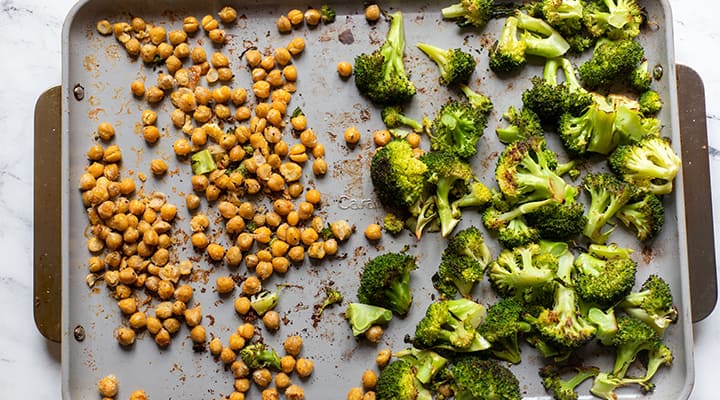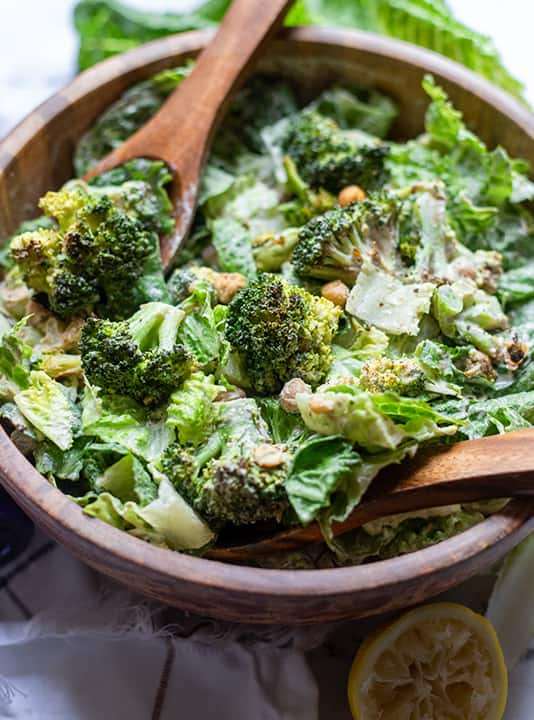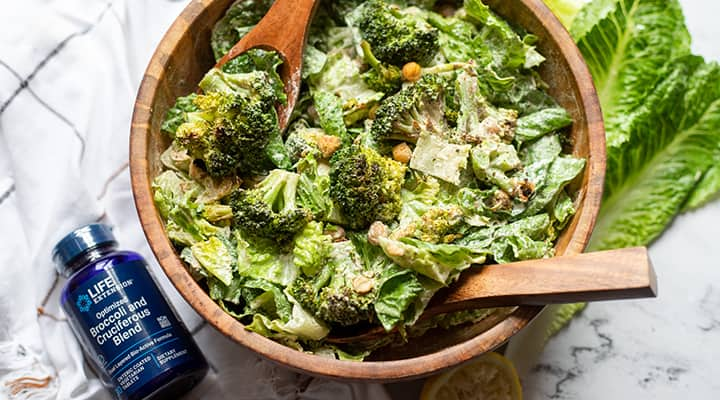
Vegan Caesar Salad: A Crowd-Pleasing Recipe
Published: August 2022
Few salads are as well-known or as popular as the Caesar salad. What is not to love about refreshing, crisp romaine lettuce and crunchy croutons tossed in a creamy dressing and then dusted with parmesan cheese?
A good Caesar salad is a marvel, capable of captivating even a salad hater with its flavor and texture delights. What’s not so delightful: its health profile, particularly for vegetarians and vegans. The traditional Caesar salad dressing is often made from vegetable or seed oils, which may not be as healthy as olive oil. Although the classic dressing recipe calls for anchovies, which can be heart healthy, they aren’t part of a vegan diet. Plus, there are more nutritious ways to add texture to the salad besides croutons, which don’t offer much nutritional value.
That is why this yummy Vegan Caesar Salad recipe is such a crowd pleaser! It tastes as decadent and delicious as the original but is full of heart-healthy fats, plant-based protein and fiber. Even without croutons, it does not skimp on the flavor and texture that everyone loves.
That means your dinner guests don’t have to be vegan to appreciate this healthy alternative.
Why is Caesar salad non-vegan?
A traditional Caesar salad recipe is decidedly un-vegan because it contains anchovies, eggs and parmesan cheese. The dressing is made with egg yolks, oil, garlic, lemon juice, Dijon mustard, anchovies, and Worcestershire sauce to produce a very thick and creamy dressing that is full of flavor. Parmesan cheese is also added to the salad when tossing it, which gives it more flavor and texture. Some cooks season the croutons with even more cheese. All of these ingredients make Caesar salad delicious, but unsuitable for vegans.
What is considered a vegan Caesar salad?
A vegan Caesar salad eliminates the cheese and has a creamy, dairy-free dressing that is made from cashews. Incredibly, it is not difficult to replicate the flavors and textures of a traditional Caesar using the right combination of vegan ingredients.
This vegan Caesar dressing has just the right ratio of salty, tangy, and umami, and it tastes almost like the real thing! Vegan Worcestershire sauce and seaweed flakes give it that nuance of anchovies that people love about the Caesar salad. If you choose, vegan parmesan cheese can help your salad mimic the original recipe.
What to serve with a vegan Caesar salad
The best thing about this vegan Caesar salad is that it can be a whole meal. Rather than including croutons, this salad has crispy roasted chickpeas, which are a great source of plant-based protein. The addition of roasted broccoli makes this vegan Caesar more filling than one that only contains romaine lettuce.
A great way to eat a loaded Caesar salad like this is to wrap it in a tortilla or flatbread to make it a heartier meal. If you want to add more protein, you could bake a vegan “chik’n” breast or toss in some cubed tofu. Or eat this salad as an appetizer for a pasta dinner.
How to make a vegan Caesar salad
You don’t have to be vegan to enjoy this vegan Caesar!
Ingredients
- 2 romaine hearts, chopped
- 2 heads broccoli in florets
- 1 can chickpeas, drained
- 1/4 tsp salt
- 1/4 tsp garlic powder
Dressing:
- 1 cup raw cashew pieces
- 6 Brazil nuts
- 1 lemon, juiced
- 1/4 tsp vegan Worcestershire sauce
- 1 pinch seaweed flakes
- 2 tbsp olive oil or extra-virgin olive oil
- 4 tbsp water
- 2 tbsp nutritional yeast
- 1/2 tsp salt
- 1 garlic clove
- Pinch of black pepper
Preparation
The preparation for this salad is easy and quick. First, roast the broccoli and seasoned chickpeas in the oven for a total time of 20 minutes. Then blend the dressing. Wait to mix the chopped romaine with the cooled broccoli and chickpeas and the dressing until right before serving.
Nutritional Value
Serves 5
Calories: 398
Carbohydrates: 40 g
Fiber: 13 g
Sugar: 7 g
Protein: 17 g
Fat: 23 g
Saturated Fat: 4 g
Polyunsaturated Fat: 5 g
Monounsaturated Fat: 12 g
Sodium: 678 mg
Potassium: 1,235 mg
Vitamin A: 5,480 IU
Vitamin C: 231 mg
Calcium: 183 mg
Iron: 5 mg
All nutritional information is based on third-party calculations and is only an estimate. Each recipe and nutritional value will vary depending on the brands you use, measuring methods and portion sizes.
Instructions
- Preheat oven to 400 degrees Fahrenheit.
- On a sheet pan, spread out the broccoli florets and the rinsed and dried chickpeas in a single layer. Spray or drizzle with olive oil. Season the broccoli with salt and the chickpeas with salt and garlic powder. Cook for 20 minutes, turning once halfway. Set aside to cool.
- Meanwhile, make the dressing by combining the cashews, Brazil nuts, lemon juice, vegan Worcestershire, seaweed flakes, olive oil, water, garlic, nutritional yeast, salt and pepper in a high-speed blender or high-powered food processor. Blend until smooth.
- Add to a large mixing bowl the chopped romaine, the cooled broccoli and chickpeas, and the dressing. Toss well and enjoy within three to five hours.
Explore Our Best Digestive Health Supplements
Crowd-pleasing vegan Caesar salad: Pro tips
Here are some pro tips for making this salad:
- Wash the romaine lettuce thoroughly. There is nothing worse than a sandy and gritty salad! My favorite lettuce washing method is to fill a large pot with water and fully immerse the lettuce leaves. Use your hand to push the lettuce down several times and mix it around. When you do this, any sand or dirt will sink to the bottom of the pot. Remove the lettuce with your hands and put in a strainer. Then pour the dirty water out of the pot and repeat the steps until the water is clean.
- Cut the romaine lettuce in perfect bite-sized pieces rather than shredding it. This will ensure a pleasurable salad experience. Chasing lettuce around with your fork is not fun, which is why shredded lettuce belongs on tacos, but not in salad.
- Be kind to your blender and soak your cashews and Brazil nuts in water with a little salt for two to four hours before giving it a whirl. Then drain and rinse the nuts before blending. This will help give your dressing a smoother texture.
- Always wait until right before serving to mix the dressing into the salad. This will ensure that the lettuce is crisp, the roasted chickpeas are crunchy, and the flavors are awesome! After mixing, the clock starts ticking, and the salad will begin to wilt. Although the vegan Caesar salad will still be edible, the components will begin to degrade and become soggy.
- Missing the crunch of those croutons? Try topping your salad with sunflower seeds or vegan parmesan cheese to add more texture and flavor.
Is vegan Caesar salad healthy?
This vegan Caesar salad is really healthy! It includes heart-healthy fats from nuts and olive oil, plus a healthy serving of fiber. The cashew-based dressing has plant-based protein and plenty of nutrients to support energy production, brain health, bone health and more.
Crispy chickpeas are a great substitute for croutons, which are usually simple carbs and empty calories. Roasted chickpeas can also be seasoned like croutons for even more flavor. They add soluble fiber and protein to this vegan Caesar, and help support already-healthy blood sugar, digestive health and bone health.
Broccoli adds bulk to the salad, and it is an important cruciferous vegetable that supports breast health, healthy hormone balance, and cellular health.
Supplementing with broccoli and cruciferous vegetables
Even when you eat your veggies, it is hard to consume them at an optimum volume every day to receive all their wonderful health benefits. That is why supplementing with Optimized Broccoli and Cruciferous Blend can help to fill any dietary gaps and supercharge your nutrient intake. This best-in-class formula helps protect cells and promotes healthy estrogen metabolism.
Other supplements are also designed to help with hormone balance. Try taking this hormone quiz to find out which supplement might be right for you!
References
- Booth, Stephanie. “Health Benefits of Broccoli.” WebMD. June, 2021. https://www.webmd.com/food-recipes/health-benefits-broccoli
- Nelson, Angela. “Chickpeas.” WebMD. August, 2020. https://www.webmd.com/food-recipes/health-benefits-chickpeas
Always be in the know!
Access the latest deals, wellness news, expert health tips & more!









